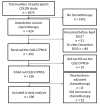Dietary Intake of Magnesium or Calcium and Chemotherapy-Induced Peripheral Neuropathy in Colorectal Cancer Patients
- PMID: 29570617
- PMCID: PMC5946183
- DOI: 10.3390/nu10040398
Dietary Intake of Magnesium or Calcium and Chemotherapy-Induced Peripheral Neuropathy in Colorectal Cancer Patients
Abstract
Chemotherapy-induced peripheral neuropathy (CIPN) is a common and severe side-effect in colorectal cancer (CRC) patients. This study assessed the association between habitual dietary intake of magnesium or calcium and prevalence and severity of chronic CIPN in CRC patients receiving adjuvant chemotherapy. For this prospective cohort study, 196 CRC patients were considered. Magnesium and calcium intake was determined using a food frequency questionnaire at diagnosis, during and after chemotherapy. Chronic CIPN was assessed 12 months after diagnosis using the quality of life questionnaire CIPN20. Prevalence ratios were calculated to assess the association between magnesium or calcium intake and the prevalence of CIPN. Multivariable linear regression analysis was used to assess the association between magnesium or calcium intake and severity of CIPN. CIPN was reported by 160 (82%) patients. Magnesium intake during chemotherapy was statistically significantly associated with lower prevalence of CIPN (prevalence ratio (PR) 0.53, 95% confidence interval (CI) 0.32, 0.92). Furthermore, higher dietary intake of magnesium during (β -1.08, 95% CI -1.95, -0.22) and after chemotherapy (β -0.93, 95% CI -1.81, -0.06) was associated with less severe CIPN. No associations were found for calcium intake and the prevalence and severity of CIPN. To conclude, we observed an association between higher dietary magnesium intake and lower prevalence and severity of CIPN in CRC patients.
Keywords: calcium; chemotherapy; colorectal cancer; magnesium; neuropathy; oxaliplatin.
Conflict of interest statement
The authors declare no conflict of interest. The founding sponsors had no role in the design of the study; in the collection, analyses, or interpretation of data; in the writing of the manuscript, and in the decision to publish the results.
Figures

Similar articles
-
Peripheral neuropathy in colorectal cancer survivors: the influence of oxaliplatin administration. Results from the population-based PROFILES registry.Acta Oncol. 2015 Apr;54(4):463-9. doi: 10.3109/0284186X.2014.980912. Epub 2014 Nov 24. Acta Oncol. 2015. PMID: 25417732
-
Hemoglobin, Body Mass Index, and Age as Risk Factors for Paclitaxel- and Oxaliplatin-Induced Peripheral Neuropathy.JAMA Netw Open. 2021 Feb 1;4(2):e2036695. doi: 10.1001/jamanetworkopen.2020.36695. JAMA Netw Open. 2021. PMID: 33587134 Free PMC article.
-
Emotional distress and quality of life during folinic acid, fluorouracil, and oxaliplatin in colorectal cancer patients with and without chemotherapy-induced peripheral neuropathy: A cross-sectional study.Medicine (Baltimore). 2020 Feb;99(6):e19029. doi: 10.1097/MD.0000000000019029. Medicine (Baltimore). 2020. PMID: 32028414 Free PMC article.
-
Goshajinkigan for prevention of chemotherapy-induced peripheral neuropathy: a systematic review and meta-analysis.Support Care Cancer. 2018 Apr;26(4):1051-1059. doi: 10.1007/s00520-017-4028-6. Epub 2017 Dec 26. Support Care Cancer. 2018. PMID: 29280005
-
Prevention and treatment of chemotherapy-induced peripheral neuropathy.Am J Health Syst Pharm. 2014 Jan 1;71(1):19-25. doi: 10.2146/ajhp130126. Am J Health Syst Pharm. 2014. PMID: 24352178 Review.
Cited by
-
Treatment and diagnosis of chemotherapy-induced peripheral neuropathy: An update.Biomed Pharmacother. 2022 Mar;147:112671. doi: 10.1016/j.biopha.2022.112671. Epub 2022 Jan 29. Biomed Pharmacother. 2022. PMID: 35104697 Free PMC article. Review.
-
Magnesium Ion: A New Switch in Tumor Treatment.Biomedicines. 2024 Aug 1;12(8):1717. doi: 10.3390/biomedicines12081717. Biomedicines. 2024. PMID: 39200180 Free PMC article. Review.
-
Cohort profile: Biomarkers related to folate-dependent one-carbon metabolism in colorectal cancer recurrence and survival - the FOCUS Consortium.BMJ Open. 2022 Dec 22;12(12):e062930. doi: 10.1136/bmjopen-2022-062930. BMJ Open. 2022. PMID: 36549742 Free PMC article.
-
Examination of the relationship between serum zinc levels and peripheral neuropathy induced by paclitaxel/carboplatin combination therapy in gynecological cancer patients.Fujita Med J. 2025 Feb;11(1):11-19. doi: 10.20407/fmj.2024-013. Epub 2024 Oct 31. Fujita Med J. 2025. PMID: 39896227 Free PMC article.
-
Lithium and preventing chemotherapy-induced peripheral neuropathy in breast cancer patients: a placebo-controlled randomized clinical trial.Trials. 2021 Nov 24;22(1):835. doi: 10.1186/s13063-021-05800-w. Trials. 2021. PMID: 34819131 Free PMC article. Clinical Trial.
References
-
- Vincenzi B., Frezza A.M., Schiavon G., Spoto C., Silvestris N., Addeo R., Catalano V., Graziano F., Santini D., Tonini G. Identification of clinical predictive factors of oxaliplatin-induced chronic peripheral neuropathy in colorectal cancer patients treated with adjuvant Folfox IV. Support. Care Cancer. 2013;21:1313–1319. doi: 10.1007/s00520-012-1667-5. - DOI - PubMed
-
- André T., de Gramont A., Vernerey D., Chibaudel B., Bonnetain F., Tijeras-Raballand A., Scriva A., Hickish T., Tabernero J., Van Laethem J.L., et al. Adjuvant Fluorouracil, Leucovorin, and Oxaliplatin in Stage II to III Colon Cancer: Updated 10-Year Survival and Outcomes According to BRAF Mutation and Mismatch Repair Status of the MOSAIC Study. J. Clin. Oncol. 2015;33:4176–4187. doi: 10.1200/JCO.2015.63.4238. - DOI - PubMed
Publication types
MeSH terms
Substances
LinkOut - more resources
Full Text Sources
Other Literature Sources
Medical
Research Materials

